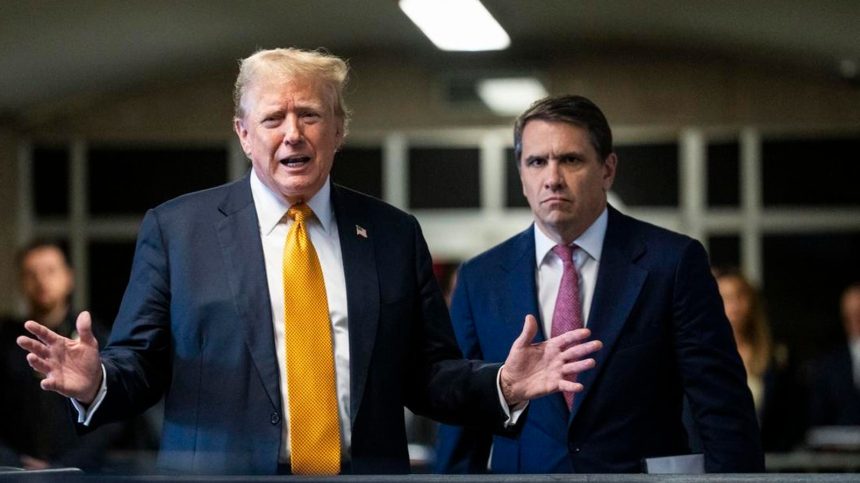Donald Trump’s legal team has launched a vigorous effort to overturn his recent conviction on 34 counts of falsifying business records in a Manhattan criminal trial. The core of their argument centers on allegations of “grave juror misconduct,” claims outlined in a letter to Judge Juan Merchan, though the specific details of these allegations remain undisclosed. Trump’s lawyers, Todd Blanche and Emil Bove, contend that the alleged misconduct tainted the proceedings and rendered the trial manifestly unfair, thus warranting a dismissal of the guilty verdict. They have requested that Judge Merchan consider these allegations as part of his broader deliberations on whether to vacate the conviction.
While the nature of the alleged juror misconduct remains shrouded in secrecy, the legal maneuvering surrounding it has taken center stage. Trump’s lawyers released redacted versions of their correspondence with the court, obscuring the specifics of their claims. Judge Merchan, in his response, acknowledged the allegations but stressed their unverified nature, characterizing them as “hearsay and conjecture.” He emphasized that a determination of their credibility would require a formal motion and a subsequent evidentiary hearing, at which point the redactions could potentially be lifted. The Manhattan District Attorney’s office, responsible for prosecuting the case against Trump, has opposed the public release of the misconduct allegations, expressing concern over potential risks to jurors’ safety and the integrity of the proceedings.
The allegations of juror misconduct form a key component of Trump’s broader strategy to overturn the conviction. His legal team has pursued multiple avenues of appeal, arguing that the verdict should be dismissed on several grounds. One argument rests on a Supreme Court ruling that grants certain immunities to presidents, a claim that Judge Merchan rejected, stating that the evidence presented at trial did not pertain to Trump’s official duties. Another line of argument centers on Trump’s recent presidential election, the implications of which are still being debated. The timing and manner of sentencing, should the verdict stand, also remain unresolved, with the prosecution suggesting a postponement until the end of Trump’s presidential term or a procedural conclusion similar to cases where a defendant dies before sentencing. Trump’s lawyers have vehemently opposed both suggestions, insisting on a complete dismissal of the verdict.
The backdrop to these legal battles is the trial itself, which stemmed from Trump’s reimbursement payments to his former attorney, Michael Cohen, for hush money paid to adult film star Stormy Daniels. The prosecution successfully argued that Trump falsely categorized these reimbursements as legal expenses, leading to the falsified business records charges. Throughout the trial, Trump was subject to a gag order restricting his comments about jurors, a measure partially lifted after the verdict, allowing him to discuss jurors and witnesses but prohibiting comments about court staff, prosecutors, and their families. The allegations of juror misconduct now emerge as a new front in Trump’s fight against the conviction.
The case against Trump represents a rare instance of a criminal proceeding continuing against a president-elect. Two federal cases against him were dismissed following his election victory. However, this Manhattan case persists, presenting unprecedented legal and constitutional questions. Judge Merchan has demonstrated deference to Trump’s unique position by indefinitely postponing sentencing, a decision previously made to avoid any perception of political bias during the election cycle.
The unfolding legal drama carries significant implications for both Donald Trump and the American legal system. The allegations of juror misconduct, while currently unsubstantiated, could potentially unravel the conviction. The broader legal arguments regarding presidential immunity and the impact of the election on ongoing criminal proceedings pose novel challenges with far-reaching consequences. The case’s trajectory will undoubtedly be closely scrutinized, as it navigates uncharted legal territory and tests the resilience of American jurisprudence. The unresolved questions surrounding sentencing further complicate the situation, adding another layer of uncertainty to this already complex legal saga.
The legal battle surrounding Donald Trump’s conviction is multifaceted and evolving. The allegations of juror misconduct, while central to the current dispute, are just one piece of a larger puzzle. The interplay of presidential immunity, the impact of the election, and the unprecedented nature of a criminal case against a president-elect combine to create a legal landscape riddled with complexity and uncertainty. The ultimate resolution of this case will undoubtedly shape legal precedent and potentially influence the future relationship between the presidency and the judicial system. As the legal proceedings continue, the nation watches, anticipating the outcome of this historic legal clash.



